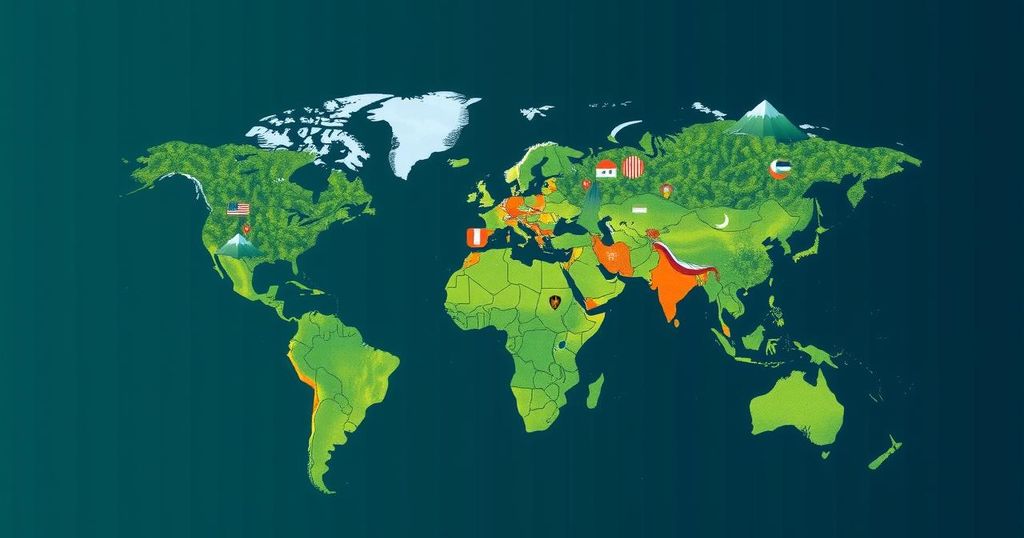The Role of Multilateral Banks in Financing Climate Action
Multilateral banks are fundamental to climate finance, particularly for developing countries, which rely on these institutions to adapt to climate emergencies and transition to renewable energy. While they have made significant strides in funding climate projects, discrepancies remain regarding investments in fossil fuels, raising concerns about their commitment to sustainable practices and the Paris Agreement.
Multilateral banks, vital institutions in the global financial landscape, play a critical role in financing initiatives aimed at combating climate change. As severe weather events escalate, countries are increasingly pressed to prepare for the impacts of hurricanes, floods, droughts, and wildfires, requiring hundreds of billions in funding for adaptation. Moreover, transitioning from fossil fuels to renewable energy infrastructures necessitates trillions of dollars in investments. Climate finance refers to the funding allocated for projects that address and adapt to climate change, with developing countries particularly reliant due to their limited access to financial resources. Multilateral development banks, such as the World Bank, are essential in providing this funding. They pooled contributions from various countries and facilitated reaching the goal of supplying developing nations with $100 billion annually, established in 2009, to combat climate change. Currently, estimates suggest that achieving the climate targets set forth in the Paris Agreement requires a fivefold increase in annual climate financing. As discussions commence at the U.N. climate conference, the focus intensifies on effective channels of funding, particularly who will bear financial responsibilities. Developing nations, significantly dependent on multilateral banks, face challenges in securing low interest rates from private lenders compared to their industrialized counterparts. While multilateral banks aim to improve living conditions and expand access to clean energy, historical funding practices reveal investment in fossil fuel projects. This apparent contradiction complicates efforts to promote sustainable energy solutions within developing nations. Analysts have observed that despite improvements in policies, multilateral banks continue to support fossil fuel projects, raising concerns over their commitments to climate goals. For instance, between 2018 and 2022, the World Bank invested $2.7 billion in fossil fuel prolonging projects, even as it emphasized support for renewable energy initiatives. Furthermore, improvements made to fossil fuel projects—such as enhancing coal efficiency—often do not align with overarching climate objectives. While the World Bank has pledged a significant shift toward climate finance, critics maintain that multiple pathways remain open for continued investments in fossil fuels, creating tensions within their stated climate strategies. In response to this contradiction, various stakeholders advocate for clear accountability and transparent commitments from multilateral banks, arguing that financing must pivot decisively toward sustainable energy solutions to avoid exacerbating existing climate risks. A call for alignment with the Paris Agreement persists, but without stringent policies, collaboration with institutions promoting fossil fuel projects remains contentious. A transformative approach is essential to enable developing nations to leapfrog carbon-intensive development phases and embrace renewable energy infrastructures.
Multilateral banks have emerged as crucial actors in the battle against climate change, particularly for developing nations that struggle with the financial resources required for necessary adaptation and energy transition projects. The urgent need for climate finance has amplified with the increasing frequency of climate-related disasters worldwide, which have compelling countries to seek better financial strategies. As the impacts of climate change become more pronounced, the importance of effective and efficient climate financing remains paramount, particularly through institutions like multilateral development banks.
In conclusion, multilateral development banks are instrumental in financing climate initiatives, particularly for developing nations that face difficulties securing funding. Despite recent commitments to align with sustainable goals, historical practices of funding fossil fuel projects pose significant challenges in achieving global climate targets. Ensuring these banks prioritize renewable energy investments is critical to bridging the climate finance gap and facilitating a just transition towards a sustainable future for developing countries.
Original Source: apnews.com




Post Comment